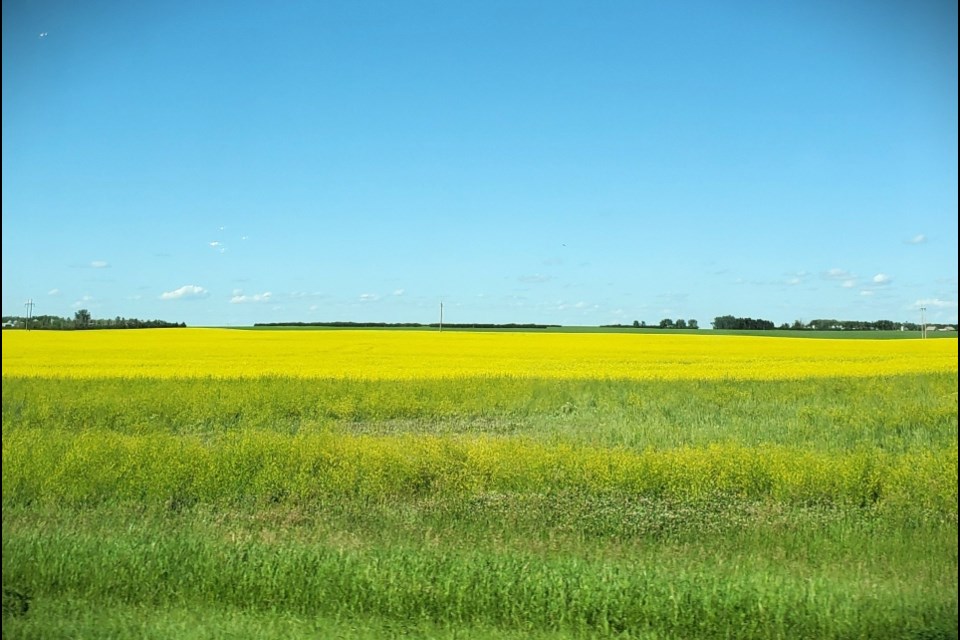SASKATOON — Premier Scott Moe is looking to use every possible means, to the point of going on a trade mission to China, to ease the rising tensions on the issue of canola oil and canola meal, after the Chinese Commerce Ministry imposed preliminary anti-dumping tariffs of 75.8 per cent, in addition to the existing 100 per cent duties on Saskatchewan’s agricultural products.
Moe, during a 30-minute-long press conference with local reporters on Tuesday, addressed China’s announcement on the anti-dumping duties on Canadian canola imports, something that has an enormous impact on the province’s oilseed farmers. China’s decision comes two weeks after the United States increased tariffs on Canadian goods from 25 per cent to 35 per cent.
“I would say that the timing of this announcement is tough on our ag producers in this province and across Canada, as they are hard at work starting their harvest procedures and getting their harvest underway. We've estimated that about 12 million acres of canola will be seeded in Saskatchewan just this year,” said Moe.
He said a trade mission to China is one of several ideas that are being considered to help the canola industry. Still, it needs to be coordinated and well planned in cooperation with federal officials in Ottawa under the leadership of Prime Minister Mark Carney and Saskatchewan’s counterparts and contacts in the province’s Chinese trade office.
“That's what our contacts in our Chinese trade office, for example, which we've been criticized for even having by the Opposition at every opportunity, wherever our trade offices are located. That [trade mission] has been an ongoing discussion that we've been having. But it needs to be coordinated with the federal government,” said Moe.
“It isn't going to be the province of Saskatchewan that signs a trade agreement with [Chinese] President Xi [Jinping]. It's going to be the Prime Minister of Canada. So, we need to make every effort to use the tools, assets, intel, and contacts that we have as a province to put our Prime Minister in a position where that conversation can happen and where these tariffs can be lifted.”
Opposition Leader Carla Beck, in a separate press event at the Legislature in Regina, has also called on Moe to go on an urgent trade mission to China to negotiate with Chinese officials to stop the latest tariffs on Saskatchewan’s canola products, with the help of the province’s trade office in Shanghai.
Minister Responsible for Prairies Economic Development Canada Eleanor Olszewski, who was in Saskatoon to announce the federal government’s $4.2 million investment in the province’s agricultural sector, assured Saskatchewan’s canola farmers that Ottawa will protect them and everyone working in the industry.
“We're very disappointed to hear about China's tariffs on canola, and we're just in the process of formulating our response to that. But we disagree with those tariffs, and, as we have in other sectors, including steel and aluminum, the federal government will make sure that we stand up for workers and protect workers in that sector,” said Olszewski.
Moe said that Saskatchewan’s role, if the trade mission pushes through, is to advise, influence, and support the federal government if ever it engages Chinese officials in further trade talks, with the help of their Chinese trade offices and industry connections, a window of opportunity as China’s current tariffs are temporary and is subject for their review in a month.
He added that they would continue to advocate for joint engagement between the provincial and federal government, industry leaders, and exporters to present a united front in developing a strategy for their negotiations with their Chinese counterparts. Provincial officials had already met with China’s foreign ministry officials in the country, and more meetings are planned.
China’s decision to implement the temporary tariffs would work to the province’s advantage, as it gives a period for Canadian officials to push for an aggressive diplomatic solution against their Chinese counterparts to avoid the duties becoming permanent. If China puts the tariffs permanently, it would be a massive blow to Saskatchewan’s canola industry.
Saskatchewan is a major contributor, almost 60 per cent, to the country’s $45-billion canola farming industry, supporting over 200,000 jobs. One third of Canada’s canola exports go to the Chinese market, totalling $5B. China’s tariffs could be retaliatory, countering Canada’s 100 per cent tariffs imposed on Chinese-made electric vehicles.
Moe is asking the federal government to provide financial assistance for canola producers, similar to what the forestry sector recently received, while also pleading with Ottawa not to sacrifice the Western Canadian agriculture industry, particularly canola farmers, to protect a smaller industry like EV manufacturers in Eastern Canada.




